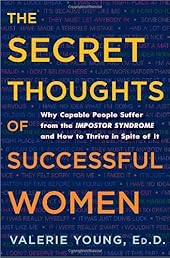
|
Price: $15.60 ( (as of 2012-10-06 23:26:20 PST) You save $9.40 (38%)
(as of 2012-10-06 23:26:20 PST) |
DescriptionIt’s only because they like me. I was in the right place at the right time. I just work harder than the others. I don’t deserve this. It’s just a matter of time before I am found out. Someone must have made a terrible mistake.If you are a working woman, chances are this internal monologue sounds all too familiar. And you’re not alone. From the high-achieving Ph.D. candidate convinced she’s only been admitted to the program because of a clerical error to the senior executive who worries others will find out she’s in way over her head, a shocking number of accomplished women in all career paths and at every level feel as though they are faking it—impostors in their own lives and careers. While the impostor syndrome is not unique to women, women are more apt to agonize over tiny mistakes, see even constructive criticism as evidence of their shortcomings, and chalk up their accomplishments to luck rather than skill. They often unconsciously overcompensate with crippling perfectionism, overpreparation, maintaining a lower profile, withholding their talents and opinions, or never finishing important projects. When they do succeed, they think, Phew, I fooled ’em again. An internationally known speaker, Valerie Young has devoted her career to understanding women’s most deeply held beliefs about themselves and their success. In her decades of in-the-trenches research, she has uncovered the often surprising reasons why so many accomplished women experience this crushing self-doubt. In The Secret Thoughts of Successful Women, Young gives these women the solution they have been seeking. Combining insightful analysis with effective advice and anecdotes, she explains what the impostor syndrome is, why fraud fears are more common in women, and how you can recognize the way it manifests in your life. With her empowering, step-by-step plan, you will learn to take ownership of your success, overcome self-doubt, and banish the thought patterns that undermine your ability to feel—and act—as bright and capable as others already know you are.
Editorial ReviewQuestions for Valerie YoungWhat is the impostor syndrome? Your book is about women--do men feel like impostors or is this a female issue? In the end, I decided there were more reasons than not to focus on women. For starters my early doctoral research looked specifically at women. Second, 80 percent of my speaking engagements come at the request of women for their female employees or students. More importantly, I aimed the book at women of because chronic self-doubt tends to hold them back more. Can men who experience the impostor syndrome benefit from this book? What would be one piece of advice from you to women entering the workforce (or academics) at any stage, with regards to impostor syndrome? Do you think it's ever too late to become a "successful" woman? What's one mistake that you've seen even the most experienced women make? Unfortunately it’s easy for women to take a man being less rattled to mean he’s more competent--or at least more confident--which to the untrained eye is often mistaken as one and the same. What is one easy thing we can do to overcome that voice inside our heads?
|
|||||||||||||||||||
Become a fan of Book Presence on Facebook for the inside scoop on latest and most exclusive books.





